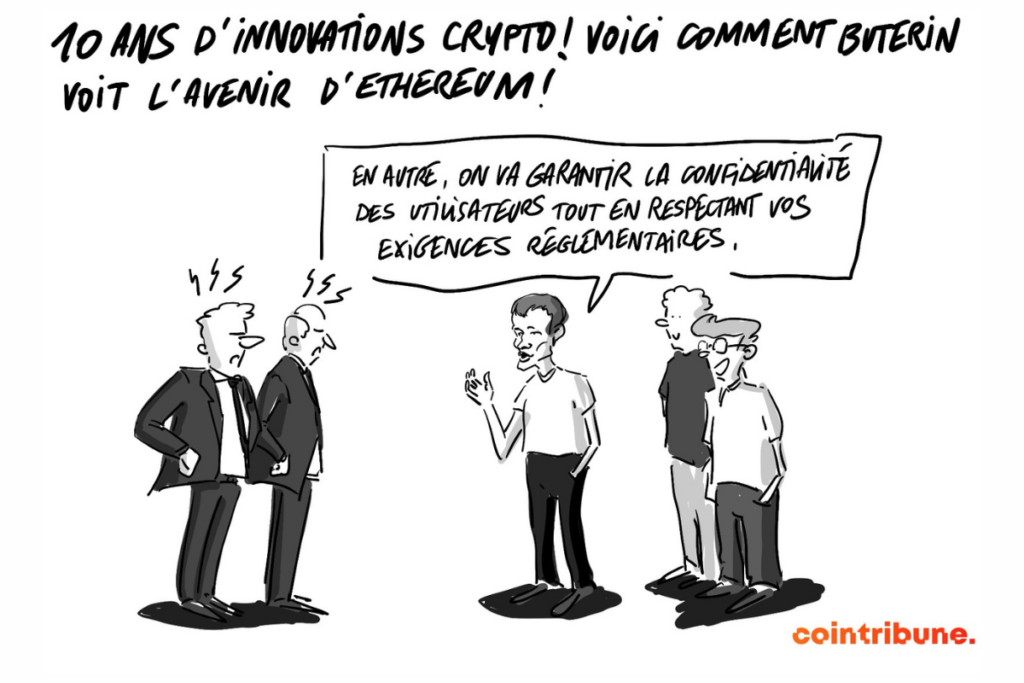Bitcoin, Binance, Ethereum, Solana and Ripple: The Biggest Crypto News of the Past Week
Between revolutionary announcements, technological advancements, and regulatory turbulence, the crypto ecosystem continues to prove that it is both a land of limitless innovations and a field of regulatory and economic battles. Here is a summary of the most notable news of the past week around Bitcoin, Ethereum, Binance, Solana, and Ripple.

Bitcoin: A solution for national debt according to Trump?
Former President Donald Trump proposed a bold idea to solve the American national debt crisis, currently at 35 trillion dollars: using Bitcoin. He suggests that the government could issue “crypto checks” to absorb dollar inflation and transform the financial system towards sound money supported by blockchain technology. This proposal, supported by other political figures like Robert F. Kennedy Jr. and Senator Cynthia Lummis, also aims to maintain the United States’ dominance in global markets. Lummis even proposed that the U.S. Treasury acquire 5% of the total Bitcoin supply as a strategic reserve. This support for a pro-crypto policy could play a significant role in future presidential elections.
Ethereum: Buterin’s plans for the future
During EDCON2024, Vitalik Buterin outlined his perspectives for the next ten years of Ethereum, focusing on the development of innovative applications and wallet security. Key areas include decentralized finance (DeFi), decentralized identities (DID) through the Ethereum Name Service (ENS), DAOs, and NFTs. Among the flagship projects are the prediction market Polymarket, the social media aggregator Firefly, the Daimo wallet, and the voting tool Rarimo. To improve security, Buterin proposes integrating private keys directly into phone chips or storing part of them with regulated custodial institutions. He also mentioned the use of zero-knowledge proofs (ZK) to link KYC information to wallets, ensuring user privacy while complying with regulations.
Bitcoin legalized in Russia for international trade
Russia has officially legalized the use of Bitcoin for international payments, a strategic decision in the face of Western economic sanctions. This legislation, approved by the State Duma and coming into effect on September 1, 2024, allows Russian companies to use Bitcoin as an alternative to the traditional banking system, especially after being excluded from the SWIFT network. The Bank of Russia, once skeptical, now adopts a pragmatic approach by recognizing Bitcoin as a foreign currency and even considers experimental crypto payments by the end of the year. Meanwhile, the country is developing the digital ruble, a digital and controlled version of its national currency, aiming to modernize its financial system while maintaining state surveillance. This openness to cryptocurrencies marks a major shift in Russian economic policy, aiming to mitigate the impacts of sanctions and explore new opportunities offered by the digital economy.
Ripple releases 1 billion XRP: A new wave coming?
Ripple has started releasing 1 billion XRP from its escrow accounts, following its monthly practice established since 2017. This release, coming from accounts ‘Ripple (24)’ and ‘Ripple (25)’, is part of a gradual management of the 55 billion XRP placed in escrow. About 44.02 billion XRP were still locked. Although these monthly unlockings are often followed by the re-escrow of a large portion of the tokens, they sometimes lead to partial sales on the market, thus increasing XRP volatility. In July, for instance, of the 1 billion XRP released, 800 million were re-escrowed, limiting market impact. Nevertheless, price fluctuations are observed following these unlockings, like in January where a sale of 226 million XRP led to a notable decrease in value. Ripple’s strategies, aimed at stabilizing the market while ensuring liquidity for its operations, are closely watched by investors.
Bybit leaves France under regulatory pressure
Bybit, the well-known crypto exchange, is exiting the French market following a warning from the Autorité des Marchés Financiers (AMF), which labeled it as a risky platform due to being unlicensed. Since August 2, French users can no longer open new positions, switching to ‘Close-Only’ mode and will have to liquidate all their open positions. The list of affected services includes One-Click Buy, Bybit Card, P2P, all Spot and derivative products, Copy Trading, Trading Bot, and Bybit Earn structured products. Unclosed positions will be automatically liquidated starting August 13. Bybit justified this decision by stating it wants to comply with local regulations, a situation similar to its exit from the Canadian market in early 2023. French users will thus have to look for alternatives on other platforms like Bitvavo, BitMart, Swissborg, or Coinbase.
That’s the main takeaway for this week. But if you want a more detailed summary and in-depth analyses directly in your inbox, don’t hesitate to subscribe to our weekly newsletter
Maximize your Cointribune experience with our "Read to Earn" program! For every article you read, earn points and access exclusive rewards. Sign up now and start earning benefits.
Diplômé de Sciences Po Toulouse et titulaire d'une certification consultant blockchain délivrée par Alyra, j'ai rejoint l'aventure Cointribune en 2019. Convaincu du potentiel de la blockchain pour transformer de nombreux secteurs de l'économie, j'ai pris l'engagement de sensibiliser et d'informer le grand public sur cet écosystème en constante évolution. Mon objectif est de permettre à chacun de mieux comprendre la blockchain et de saisir les opportunités qu'elle offre. Je m'efforce chaque jour de fournir une analyse objective de l'actualité, de décrypter les tendances du marché, de relayer les dernières innovations technologiques et de mettre en perspective les enjeux économiques et sociétaux de cette révolution en marche.
The views, thoughts, and opinions expressed in this article belong solely to the author, and should not be taken as investment advice. Do your own research before taking any investment decisions.